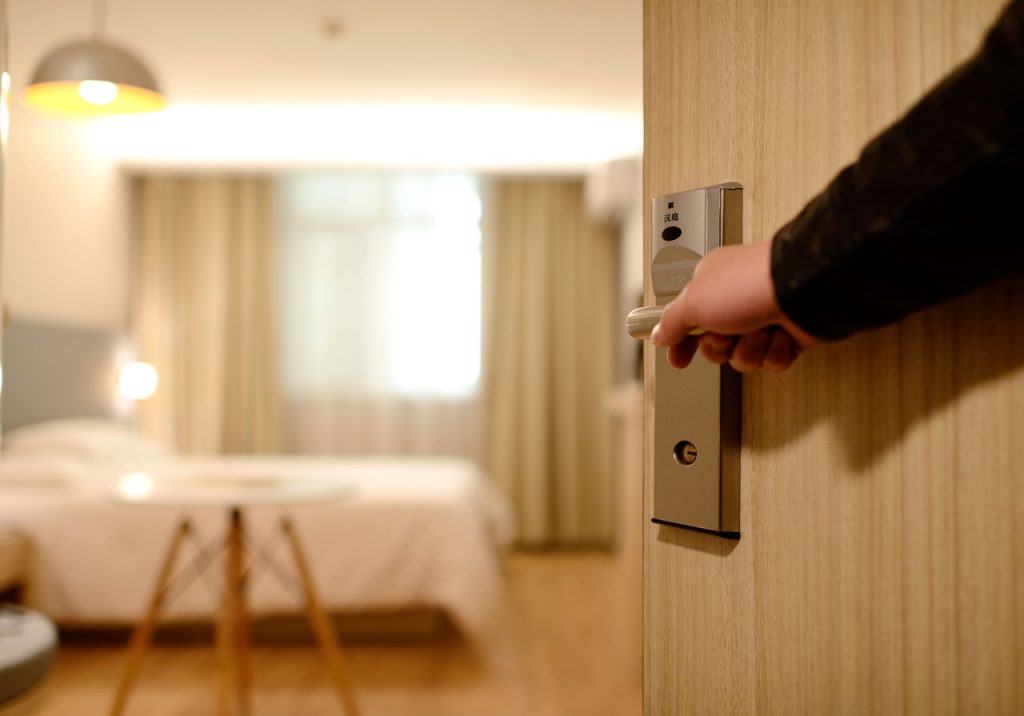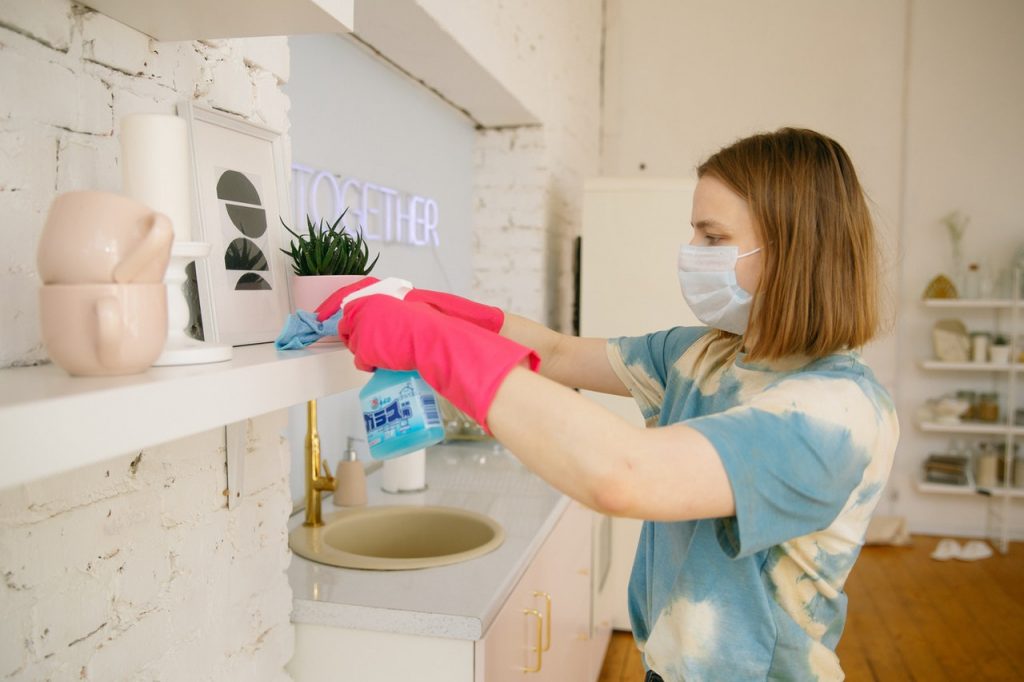PUBLIC ACCOMMODATIONS FACE NEW REQUIREMENTS RELATED TO COVID-19

While many are familiar with the liability protections for businesses that came from Senate Bill 4 (SB4), it also implemented new requirements for public accommodations to limit the transmission of COVID-19 among employees and guests. Those provisions include implementation of a written response plan, which includes procedures for sanitization and handwashing, screening and social distancing, and paid time off for COVID-19 testing and quarantine.
SB4 was signed into law by Governor Sisolak on August 11. The provisions addressing the new public accommodation requirements were set to go into effect immediately upon adoption of required regulations. The Nevada Department of Health & Human Services issued the required regulations on August 31.
Who is a Public Accommodation?
SB4 defines a public accommodation as a hotel and casino, resort, hotel, motel, hostel, bed and breakfast facility, or other facility offering rooms or areas to the public for money on an hourly, daily, or weekly basis. That is without regard to the size of the accommodation or to the number of employees.
Written COVID Response Plan Required
SB4 requires and the regulations reiterate that public accommodations must establish, implement, and maintain a written COVID response plan designed to address instances of COVID among employees and guests.
The plan must include:
- Designation of a person or persons responsible for overseeing and implementing the plan
- A requirement that all new employees and all returning employees must undergo COVID testing
- Designation of an area for employees to check in every day for COVID screening, including contact-free temperature screening
- A requirement that the public accommodation will notify each employee who is known to have close contact with a confirmed case of COVID – whether guest or employee – within 24 hours or as soon as practicable after learning of the positive case
- Those employees will undergo COVID testing and be given up to 3 days of paid time off for testing and awaiting results. Additional paid time off may be available if documentation of a delay in testing or results is provided to the public accommodation.
- A requirement that each employee who has a reasonable belief or been advised that he/she has been in close contact with a confirmed COVID case will undergo testing
- Those employees will be entitled to, for the first such instance, up to 3 days of paid time off to await testing and results. Additional paid time off may be available if documentation of a delay in testing or results is provided to the public accommodation.
- A requirement that each employee who notifies their employer that they are experiencing symptoms of COVID undergo testing and must not return to work while awaiting results of the test
- Those employees will be entitled to, for the first such instance, up to 3 days of paid time off to await testing and results. Additional paid time off may be available if documentation of a delay in testing or results is provided to the public accommodation.
- A requirement that each employee who tests positive for COVID-19 or is otherwise diagnosed and is working or has returned to work will be allowed 14 days off, of which 10 days must be paid time off
- A requirement that testing for COVID done pursuant to these requirements are provided at no cost to the employee and performed on-site or at a testing facility selected by the public accommodation
- A requirement that any employee required to be tested under these new requirements provide the results to the public accommodation
- A requirement that any guest who tests positive for COVID-19 or is otherwise diagnosed must be requested to leave the public accommodation, if practicable, and seek medical attention
- A requirement that information regarding employees or guests who test positive for COVID-19 or who is otherwise diagnosed or reports symptoms of COVID-19 must be kept confidential, unless the employee or guest agrees or is otherwise required to be disclosed to public health officials and for contact tracing or cleaning
Any paid time off required as part of the written COVID response plan is in addition to any paid time off the employer otherwise provides by law or policy. While paid time off pursuant to SB4 cannot be deducted from paid time off provided by NRS 608.0197, it can be counted against the paid sick leave provided by the Families First Coronavirus Response Act (FFCRA), if applicable. Paid time off taken as required by SB4 is calculated at the base rate of pay for the employee.
For purposes of determining who has had close contact with a confirmed COVID case under these requirements, the regulations adopted by the Nevada Department of Health and Human Services state that “close contact” has the same meaning as defined by the Centers for Diseases Control and Prevention (CDC).
Required Standards of Cleaning and Sanitization

SB4 requires public accommodations implement certain standards of cleaning to reduce the transmission of COVID-19. The regulations promulgated by the Nevada Department of Health and Human Services establish those standards.
Using cleaning products qualified by the EPA for use against COVID-19, public accommodations must provide regular cleaning of high touch areas. Those areas include:
- Fixtures with which guests and employees may be expected to have regular physical contact
- Doors and door handles at exterior entrances and at interior entrances regularly accessed by guests and employees
- Regularly used computer keyboards, touch screens, credit card readers, printers, telephones, light switches, ice machines, vending machines and other frequently used instruments and equipment
- Countertops and desks in entrance areas and other high-usage areas
- Glass surfaces, desks, tabletops, door handles and light switches in public areas
- Counters, desks, touch screens, keyboards, credit card readers and desktops in front desk areas
- Key cards and other types of keys for accessing rooms to be cleaned before those key cards or other keys are issued to another guest or removed from circulation for at least 24 hours after a guest checks out
- Elevator buttons and rails in guest and service elevators if the elevator is in use
- Sinks, faucets, walls, toilets, toilet paper dispensers and door handles in employee and public restrooms
- Work surfaces, tables, utensils, counters, touch screens and keyboards in areas used for food preparation
- Tables, desks, tabletops, door handles and light switches in shared offices, employee locker rooms and employee cafeterias
- Exercise equipment, weights, tables, countertops, chairs, lockers and benches in fitness centers
- Tabletops in meeting rooms while in use
- Tables, bartops, menus and presentation holders in bar and dining facilities after use by a guest
- Touch screens and keyboards in bar and dining facilities while in use
- Soiled laundry as necessary and laundry carts and hampers while in use
Required Social Distancing Protocols
In addition to regular cleaning, public accommodations must establish social distancing protocols and train staff on the prevention and mitigation of COVID-19 transmission. Social distancing protocols must include:
- Methods to encourage employees to maintain at least 6 feet of distance from other employees and guests during work and while on break
- Methods of encourage guests to remain 6 feet apart from employees and other guests
- Ensuring that employee breaks are structured in such a way to allow for social distancing to the maximum extent recommended by the CDC
- Separating workstations by physical barriers or to allow for social distancing where practicable
- Requirements regarding the frequency of handwashing for employees and that each employee is provided with access to facilities for handwashing or hand sanitizer within a reasonable proximity to their work area
- Establishing policies for the availability of hand sanitizer in areas where hand washing facilities are not close, including breakrooms and cafeterias, employee meeting areas, entrances to the facility, and on the casino floor, if applicable
- Establishing policies for the provision of masks and, where appropriate, gloves at no cost to employees
The regulations require public accommodations to document and maintain records of staff training on COVID-19 prevention and mitigation and make those records available to the relevant health authority, upon request.
Who Enforces These Requirements?
While the regulations that implement the requirements outlined by SB4 are issued by the Director of the Nevada Department of Health and Human Services, enforcement of the requirements has been assigned to the district health department where the public accommodation is located.
SB4 provides that upon receipt of a complaint, or at any time, the district health department may inspect a public accommodation for compliance with the requirements outlined above and may impose fines where violations are found. Inspections of public accommodations with more than 200 rooms available will occur at least once every 3 months or at least once every 2 months for all resort hotels.
Where violations are found, the district health department will order the public accommodation to correct the violation and may impose an administrative fine of up to $500 for each initial violation and up to $1,000 for each subsequent violation. The district health department may also notify the Nevada Gaming Control Board, Secretary of State, or any local government entity responsible for licensing or regulating public accommodations.
We will continue to monitor the implementation of these requirements and advise employers of any changes to the requirements or guidance from regulatory bodies to ensure employers have the most current information to remain complaint. Contact NAE if you have questions regarding these requirements or need guidance with COVID-related employment issues.
Join Our Mailing List
Sign up here to receive monthly email updates on the latest NAE news, HR issues, special events, training dates and more!
